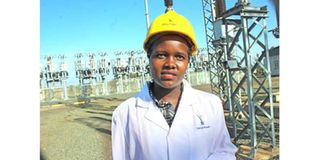Gender-based occupational segregation has no place in modern society

Faith Koome, 33-year-old engineer at Kenya Power Eldoret region. There are few female engineers in Kenya.
What you need to know:
- For years, the mention of the word ‘doctor,’ for instance, brought to mind the image of a man, and nursing was known to be a woman’s domain.
- Many other professions like engineering are considered masculine.
Gender-based occupational segregation has been one of the major hindrances to women’s empowerment and, by extension, equality.
Men have been the beneficiaries of this form of segregation, with many fields perceived as their preserve. In such ill-conceived arrangements, women face discrimination and are often viewed as outcasts when they make bold moves and pursue male-dominated careers.
For years, the mention of the word ‘doctor,’ for instance, brought to mind the image of a man, and nursing was known to be a woman’s domain. Many other professions like engineering are considered masculine. It is no wonder more men than women end up pursuing them. The situation is aggravated by widespread misconception that women and girls are bad at sciences and maths.
Our society is not used to seeing women electricians, technicians and plumbers either. The net effect of this misconception is that women’s labour force participation in certain fields remains insignificant; they face a lot of restrictions along the way. Consequently, men disproportionately hold jobs that pay more, and the converse holds true.
Societal biases have only helped to entrench such beliefs. This is evident in our education system in terms of the courses male and female students prefer to pursue, and in the job market with regard to the roles women and men perform. Their gravitation towards certain professions or tasks is mainly due to socialisation, which – to a large extent, even in contemporary society – perpetuates inequality.
Over time, the problem has become systemic, thus accounting for most of the disparities in the rewards garnered by men and women from their jobs or careers. Within workplaces, it creates differences in working conditions, authority, and opportunities for upskilling and upward mobility.
Policy solutions that tackle occupational segregation, in whatever form, should promote equitable access to education and employment. Dominance of one gender in a particular field does not bode well for efforts targeted at creating an equal world.
On account of the prevailing realities, interventions should boost awareness and disabuse society of the prehistoric notions that have pervaded our economic and cultural systems.
One of the arguments used to support women’s exclusion is that they are not ready or willing to do hard jobs. However, this is not true as roles are mostly socially constructed. It is clear that the more ungendered professions are, the better they are for countries, especially towards achieving development goals. Kenya is no exception.
Across the world, women have unquestionably proved that they can participate in all fields and do just fine, including in the military. Despite the gender imbalance in professions and workplaces, they have had milestones. With each passing day, those in male-dominated fields are demonstrating that they, too, are equal to the task. They are effective and resilient.
One such case is Lindah Kemboi, a veterinary officer making a mark in Kenya’s North Rift region. She is proof that women are as good of professionals as men, if not better. The large number of farmers seeking her services to boost livestock production is an indication of her level of expertise and dedication.





